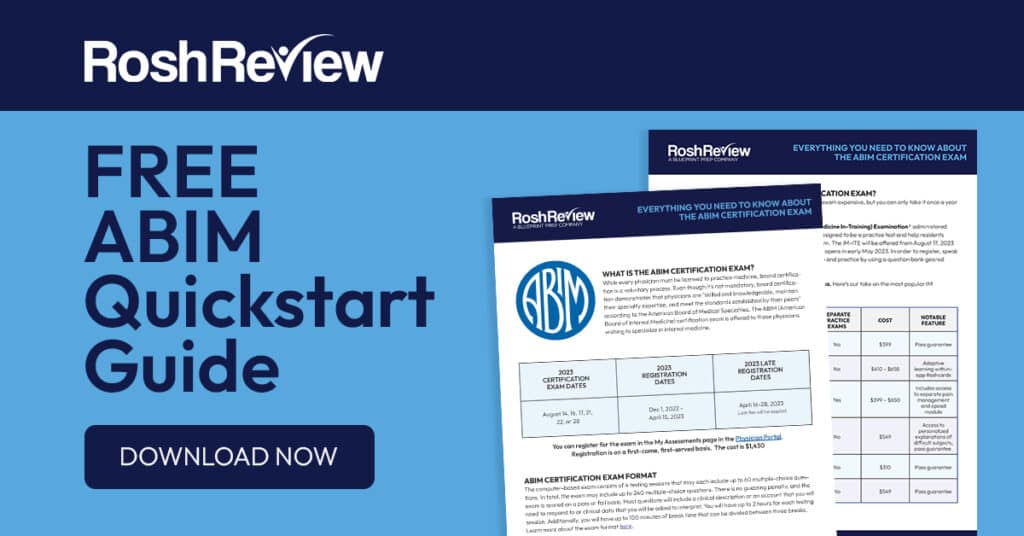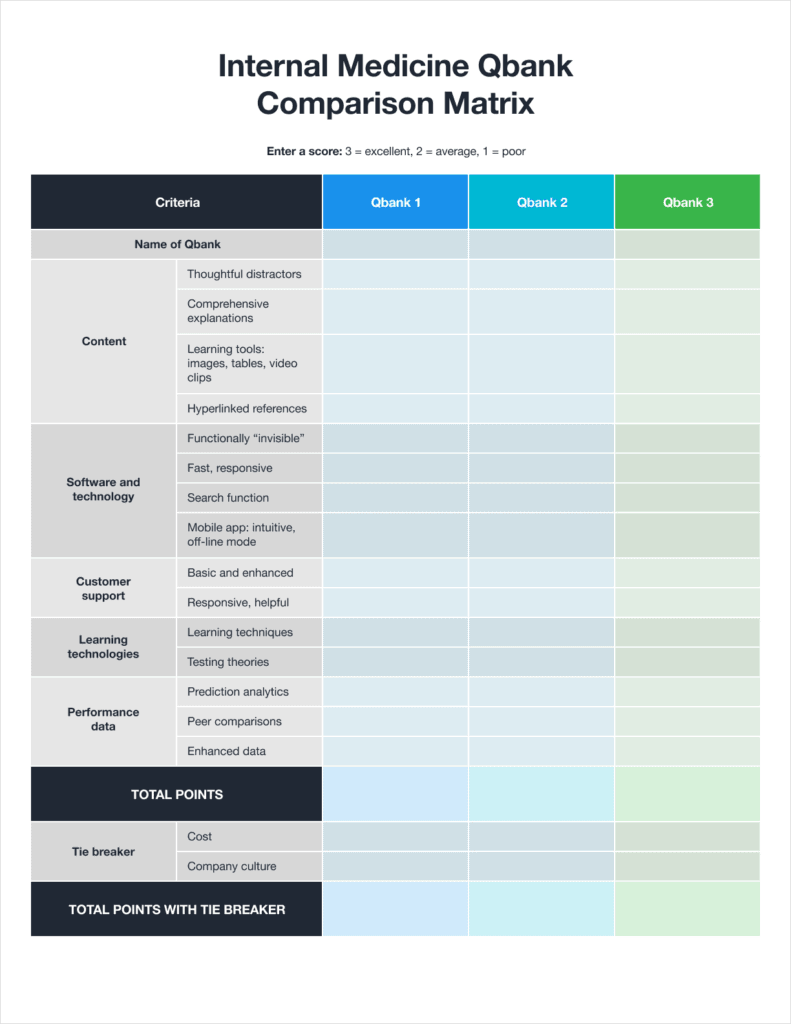How to Select the Best Internal Medicine Board Review Qbank in 2025

Every day, customers ask us the same question in several variations: What is the best internal medicine board exam review? Why is your Qbank the top internal medicine board review? How do Blueprint/Rosh Review’s internal medicine Qbanks compare vs MKSAP, MedStudy, UWorld, NEJM Knowledge+/AMBOSS, TrueLearn, BoardVitals…?
We understand the importance of the question. Purchasing a Qbank for your certification exam or internal medicine ITE (IM-ITE) costs more than money. Depending on the quality of the Qbank and the outcome of your exam results, it will save or cost you time. And time is a limited resource.
You may still have time to choose a Qbank, though here’s a reminder of the 2025 exam dates:
- Certification exam: August 12, 14, 19, 26, and 27, 2025
- IM-ITE: TBD
Let’s state the obvious: we sell Blueprint/Rosh Review Qbanks for internal medicine board review, and a Blueprint/Rosh Review Qbank might not be the best fit for you. UWorld, MKSAP, MedStudy, or NEJM Knowledge+/AMBOSS might be a better fit. In fact, you might not even need a Qbank and would benefit more from live courses such as the American College of Physicians (ACP) Internal Medicine Board Review (IMBR) courses or a do-it-yourself program. This article will discuss the key decision criteria that will help you answer your most important question: Which internal medicine board review is right for me?

Studying for the ABIM board exam in 2025? Download the FREE ABIM Quickstart Guide with exam information, high-yield topics, and more!
Do you really need an internal medicine Qbank?
Some individuals do not use a Qbank for their board preparation. Whether it’s the internal medicine board review, the internal medicine shelf exam or the SPEX exam, consider these questions if you think a Qbank is best for your continuing education:
- Do you have the self-discipline to study on your own?
- Do you like curating your own curriculum around the American Board of Internal Medicine (ABIM) content blueprint by reading journals and using review books to create practice questions, listening to internal medicine podcasts, or free content available on the web?
- Can you make the content relatable enough without a question bank to remember it out of context for questions on the real certification examination?
- How much time can you invest in preparing for your certification examination, and how much time will you invest?
- How much money can you invest in this board review tool?
- Are you planning to supplement your studies with a live course or another resource?
As you answer these questions along your search for an internal medicine board review resource, consider the many options available to you along the spectrum of your investment of time and money, such as the following:
- Live or online courses or “boot camps,” which offer peer-to-peer interaction and “force” you to make exam preparation a priority over a two- to four-day period. As a side benefit, you get to focus your practice questions with little distraction. Check out the ACP Internal Medicine Board Review courses or the annual Mayo Clinic Internal Medicine Board Review course.
- Free Open Access to Medical Education, which offers quality content at no cost. As a side benefit, you can learn from your home, favorite coffee shop, or the beach on your time. Check out Life in the Fast Lane or Louisville Lectures.
Picture yourself in each of these settings: Sitting at your desk, googling “atrial fibrillation” on your computer as you self-study. Or booking flights, flying to a popular city, spending two to four days in a conference room with your peers and some big screens. Or watching lectures online and reviewing board review questions during a live course. Or answering hundreds of curated internal medicine questions from your smartphone between shifts or at a cafe. You might picture yourself in all three scenarios. You need to be ruthlessly honest with yourself about what is best for you as you consider these options.
If you believe you still need an internal medicine Qbank, read on. If not, you can save time and click on another internal medicine board review article on the web.
Content, Content, Content
Now that you determined you do need an internal medicine Qbank, you have many options. You need selection criteria that provide the best outcome for you, not the marketer.
Hint: It’s all about the content.
High-quality content should be the primary decision criteria (nobody selects low-quality content, at least not intentionally). Your challenge begins here. Every internal medicine Qbank company makes the claim of offering high-quality content in different forms such as “closest to the boards,” “meticulously crafted,” and “high yield.” What is the definition of high-quality content that suits your needs?
Every internal medicine Qbank you consider should provide content around these building blocks:
- Authored and peer-reviewed by internal medicine faculty, clinicians, and program directors.
- Created to align with the ABIM format. There should be no “negatively phrased” questions, no “all of the following except,” no “A and B”…you know what we mean.
- Addresses the right content and is well structured. These two basic criteria are imperative in order for a test question to be high quality.
- Explains why an answer is correct or incorrect. Understanding why an answer choice is incorrect is just as important as knowing why it is correct
If the internal medicine Qbank you are considering for your ABIM exam does not meet these basic requirements, you should quickly eliminate it from your consideration.
Basic or Comprehensive Content
Fortunately, most internal medicine Qbanks create questions around these building blocks, but that may not help you to make your selection. You need to dig deeper to determine which type of content works best for you by asking the following questions:
- How strong are the distractors in the answers? The difficulty of a question is defined by the choice of distractors. Good distractors determine the difficulty level of a question.
- How detailed are the explanations? Too much and you feel like you’re reading a medical journal. Too little and you’re not getting enough supporting content to learn the topic well.
- Is there additional content to enhance your learning such as images, tables, video clips, teaching aids, or condensed bullet points? Are they memorable enough to stick with you on exam day?
- Do they offer multiple paths to understand and solidify your knowledge of the topic with additional questions on the topic?
- Do they offer multiple references and hyperlinks to those references if you want to dive deeper into the subject?
Again, you are in the best position to determine what you need from the content—something that just scratches the surface or something more comprehensive that provides multiple viewpoints. This is analogous to ECG interpretation. Can you make a diagnosis looking only at a rhythm strip or the limb leads, or would more info from the precordial help you better interpret the ECG? If you only need the rhythm strip, consider a basic internal medicine Qbank. If you need 12-leads, select a comprehensive IM Qbank that provides the context and reinforcement to gain a deeper understanding of each topic.
Where the Rubber Meets the Road
You’re making a big investment in time and money, which impacts your career, your patients, and your livelihood. The only way to assess the content is to experience it yourself. Sign up for a free trial for each IM Qbank that you are considering. Yes, you’ll probably get a few extra emails now that you shared your contact info, but the hassle of unsubscribing from the companies you don’t select will be outweighed by the confidence you gain by making the right decision.
If these internal medicine Qbanks aren’t already on your evaluation list, you should add them. Check out the following (listed in alphabetical order to avoid bias):
- Blueprint/Rosh Review
- BoardVitals
- MedStudy
- MKSAP
- NEJM Knowledge+/AMBOSS
- TrueLearn
- UWorld
Keep an open mind during the evaluation. Your due diligence will pay off. Once you get into study mode, you want to eliminate the time, energy, and distraction of questioning your internal medicine Qbank decision.
Internal Medicine Qbank Free Trial Evaluation
You’ve signed up for the free trial and are evaluating content based on what you need for a successful outcome. What else might you consider as you interact with the content? These attributes will enhance or detract from your preparation, providing a “Wow” experience or an “Ugh” experience. Remember: you’ll be viewing hundreds of questions, if not thousands. Small details matter when you repeat something over and over.
Software Design and Technology
Do you like the way you experience the content? As you answer questions and read the explanations, take time to look at the buttons, fonts, colors, white space, and page layout. The software doesn’t need to be flashy. Rather, it needs to be highly functional so it doesn’t distract you from the content. The interface should be seamless and intuitive. After taking 10 or 20 questions, the software should become “invisible” so you can focus on learning.
Are time-saving features built into the platform? See if you can name your exams for better organization and retrieval. Check if you have the ability to search your answered questions. You can save precious time by being able to search your questions, answers, explanations, and images.
Does the application function quickly? A three-second improvement in performance might not seem like a big deal, but when you multiply that by thousands of questions answered and explanations reviewed, that can add up to one to two days of your life.
View the questions on the devices you plan to use to study on. If the IM Qbank offers an iPhone or Android app, take the time to download it to your phone or tablet. Will you be studying when you are not able to connect with Wi-Fi (e.g., on a clinical shift with tight IT firewalls or on the subway)? If so, make sure the IM Qbank you use has an “offline” mode. You want to prepare for all the situations and slices of time that you’re able to study.
Customer Support
You need to evaluate customer support in the same way you evaluate the content. Internal medicine Qbanks offer a wide spectrum of support options:
- Basic: account administration and technical support
- Medium: content correction and updates
- Enhanced: internal medicine doctors available to clarify questions, discuss conflicting evidence, and suggest strategies to understand the topic
Test them out by sending a support ticket. Do you receive a response? Do they publish customer support feedback? You will find varying levels of support and can determine whether their support model suits your needs.
Learning Technologies
Learning technologies continue to emerge, advance, and disappear. They all center around learning and test theories combined with high volumes of data and vast computational power.
Here are the classic learning techniques:
- Retrieval practice: recalling facts, concepts, or events from memory
- Spaced repetition: studying information more than once but leaving considerable time between practice sessions
- Interleaving: studying two or more topics at a time
- Elaboration: finding additional layers of meaning in new material
- Generation: attempting to answer a question or solve a problem before being shown the answer
Test theories:
- Classical Test Theory (CTT): Your goal with exams (and question banks) is to get the most correct answers. Exam providers report percent correct, and exam takers strive to score 100%. Scores are evaluated independently.
- Item Response Theory (IRT): Assumes that questions measure some underlying latent trait. Exam providers view responses simultaneously, looking at thousands of test takers and thousands of questions.
While reviewing internal medicine Qbanks, you might find the term “adaptive learning.” You’ll see it in other forms such as smart bank or prescriptive learning, and it can be defined in many ways. Adaptive learning originated in the K12 market. Companies are testing this technology in the graduate medical education (GME) market to determine whether these concepts can improve outcomes. If you value this feature, ask more questions about the underlying technology and algorithms incorporated into the product.
As you review the learning and testing theories, you’ll see that many of these concepts can be applied to your exam preparation with or without technology assistance. Technology can be helpful, but it also can be a distraction. Good practice will always beat a theory.
Predictive Analytics, Peer Comparison, Performance Analysis
Internal medicine Qbanks can offer lots of data to help you identify your unknown unknowns, self-remediate, and predict your score. Check out their performance dashboards to see what tools you might use to streamline your preparation time.
Basic information should include the following:
- Number of questions (total, used, unused)
- Performance-based on ABIM blueprint
Enhanced information includes additional data:
- Projected exam score
- Probability of passing
- ABIM blueprint subcategories
- Performance breakdown based on age, acuity, type (e.g., first order, second order), and Bloom’s Taxonomy
- Options to count skipped and unanswered questions
How are you doing relative to your peers who are preparing for the same exam? Did the majority of examinees miss the same question? Or are you in the minority that missed this particular question? Many individuals find this data motivational. Others find it a distraction.
The Internal Medicine Qbank Comparison Matrix
Now that we’ve covered the major factors to consider during your free trials, it’s time to create your grid. This decision needs to be right for you, not a marketer.

Here are the steps we recommend taking to complete an effective evaluation using the Internal Medicine Qbank Comparison Matrix:
- Narrow the Qbanks you want to compare to three. The incremental benefit of adding additional internal medicine Qbanks to the evaluation is low.
- Rank the Qbanks using the criteria: 3 = excellent, 2 = average, 1 = poor.
- Add up the points in each column.
You will note that we included cost and company culture at the bottom of the matrix. You can use these as tiebreakers.
Comparing the Costs of Internal Medicine Qbanks
We rarely complain about paying too much for something that is high quality—a product that delivers on its promises. We also know what it feels like when we purchase something cheap that disappoints. That’s why we place cost near the bottom of the criteria list.
Are CME credits included? Is there group pricing or military discounts? Do a web search with the product name plus “discount” to see what’s available so you save money where you can. If price is the most important criterion for you, calculate the cost per question and skip the evaluation.
Company Culture and Values
Do a web search on the company. Who leads it—a physician or business operator? Does leadership include experienced educators, faculty, and former program directors? Individuals who have dedicated their lives to fostering the success of others on their medical education journey? Or is the company led by venture-funded marketing gurus?
When you purchase a Qbank, you not only invest in your personal success but also in the success of others. Your money goes towards the cost of producing and supporting the product, the livelihood of the company’s employees, and the company’s profits. Does the organization align with your values? Where do the profits flow to shareholders with dividends, to customers through more innovation, to the internal medicine community with scholarships and grants, to programs that eliminate disparity in education, to initiatives to help eliminate the world’s most pressing health crises?
Decide and Act
Now it’s time to make your decision. At this stage, your head and heart (some say gut) should be aligned. Enjoy the purchase of your internal medicine Qbank and prepare to conquer this next milestone in your career. We’re cheering for you.
Get Free Access and Join Thousands of Happy Learners
FAQs
Get a little more clarification
- BoardVitals
- MedStudy
- MKSAP
- NEJM Knowledge+
- Rosh Review
- TrueLearn
- UWorld
- Answer a question from a Qbank
- If you answer incorrectly, read the explanation
- Take notes about why the correct answer is correct, and make sure to take notes on anything in the explanation that you didn’t already know
The “How to Boost Your Score” article also includes day-of tips like which grammatical mistakes to keep an eye out for to help you narrow down answer choices. Our goal is to help you succeed, so read as many of these tips as you can before exam day.
If you’re interested in using multiple Qbanks together, you can play to each one’s strengths to further boost your knowledge. For example, if your program gives you access to MKSAP, read this honest assessment from an IM resident explaining How to Use Rosh Review with MKSAP for ABIM Board Review.
After practicing with these questions, if you decide you're ready for thousands of additional questions to help you confidently prep for your certification exam, you can easily upgrade to a full Qbank subscription.
You must be logged in to post a comment.






Comments (0)